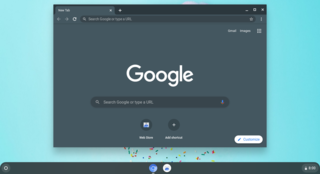Related Research Articles

In computing, a device driver is a computer program that operates or controls a particular type of device that is attached to a computer or automaton. A driver provides a software interface to hardware devices, enabling operating systems and other computer programs to access hardware functions without needing to know precise details about the hardware being used.

A Linux distribution is an operating system made from a software collection that includes the Linux kernel, and often a package management system. Linux users usually obtain their operating system by downloading one of the Linux distributions, which are available for a wide variety of systems ranging from embedded devices and personal computers to powerful supercomputers.
Microsoft Windows is a group of several proprietary graphical operating system families developed and marketed by Microsoft. Each family caters to a certain sector of the computing industry. For example, Windows NT for consumers, Windows Server for servers, and Windows IoT for embedded systems. Defunct Windows families include Windows 9x, Windows Mobile, and Windows Phone.
A network operating system (NOS) is a specialized operating system for a network device such as a router, switch or firewall.

FreeDOS is a free software operating system for IBM PC compatible computers. It intends to provide a complete MS-DOS-compatible environment for running legacy software and supporting embedded systems.

A live CD is a complete bootable computer installation including operating system which runs directly from a CD-ROM or similar storage device into a computer's memory, rather than loading from a hard disk drive. A live CD allows users to run an operating system for any purpose without installing it or making any changes to the computer's configuration. Live CDs can run on a computer without secondary storage, such as a hard disk drive, or with a corrupted hard disk drive or file system, allowing data recovery.

fdisk is a command-line utility for disk partitioning. It has been part of DOS, DR FlexOS, IBM OS/2, and early versions of Microsoft Windows, as well as certain ports of FreeBSD, NetBSD, OpenBSD, DragonFly BSD and macOS for compatibility reasons. Windows 2000 and its successors have replaced fdisk with a more advanced tool called diskpart.

Multi-booting is the act of installing multiple operating systems on a single computer, and being able to choose which one to boot. The term dual-booting refers to the common configuration of specifically two operating systems. Multi-booting may require a custom boot loader.
Linux adoption is the adoption of Linux computer operating systems (OS) by households, nonprofit organizations, businesses, and governments.
Caldera OpenLinux (COL) is a defunct Linux distribution. Caldera originally introduced it in 1997 based on the German LST Power Linux distribution, and then taken over and further developed by Caldera Systems since 1998. A successor to the Caldera Network Desktop put together by Caldera since 1995, OpenLinux was an early "business-oriented distribution" and foreshadowed the direction of developments that came to most other distributions and the Linux community generally.
The following is a timeline of virtualization development. In computing, virtualization is the use of a computer to simulate another computer. Through virtualization, a host simulates a guest by exposing virtual hardware devices, which may be done through software or by allowing access to a physical device connected to the machine.
The bundling of Microsoft Windows is the installation of Microsoft Windows in computers before their purchase. Microsoft encourages original equipment manufacturers (OEMs) of personal computers to include Windows licenses with their products, and agreements between Microsoft and OEMs have undergone antitrust scrutiny. Users opposed to the bundling of Microsoft Windows, including Linux users, have sought refunds for Windows licenses, arguing that the Windows end-user license agreement entitles them to return unused Windows licenses for a cash refund. Although some customers have successfully obtained payments, others have been less successful.

ChromiumOS is a free and open-source operating system designed for running web applications and browsing the World Wide Web. It is the open-source version of ChromeOS, a Linux-based operating system made by Google.

Nova is a Cuban state-sponsored Linux distribution launched in February 2009. It was developed in Havana at the University of Information Science (UCI) by students and professors to provide free and open-source software (FOSS) to inexperienced users and Cuban institutions. While the initial version was Gentoo-based, the developers switched to Ubuntu beginning with Version 2.1.
Comparison of user features of operating systems refers to a comparison of the general user features of major operating systems in a narrative format. It does not encompass a full exhaustive comparison or description of all technical details of all operating systems. It is a comparison of basic roles and the most prominent features. It also includes the most important features of the operating system's origins, historical development, and role.
References
- ↑ Vance, Ashlee (6 October 2005). "How Dell repels attempts to buy its 'open source' PC". The Register .